Gunpowder plot: a night that could change a lot
Religious conflict
In 1603, the Scottish king, James VI, ascended the English throne, thereby uniting the two crowns. The new sovereign became known as Jacob I and began to confidently rule the country. Catholics perceived his ascension as the beginning of an era of change. They hoped that the king would be more supportive of them than the previous ruler. But very quickly their dreams melted. Jacob began to pursue a policy of moderate Protestant reforms and rather severely suppressed inclinations of belligerent Catholics, as well as representatives of ultra-Protestant trends. But despite this, the king was very tolerant of Catholics. Therefore, he did not disperse the Catholic party, "seething" at the court. But, naturally, this was not enough. And the Catholics decided that there was no place on the throne for a person who professed Protestantism.
So the plot was born. As planned, the participants were supposed to liquidate the objectionable monarch, and to give the throne to his young daughter Elizabeth. The conspirators wanted to educate Elizabeth “correctly” by assigning Catholic regents to her. Accordingly, in the “new world” there would no longer be a place for Protestants. The idea, of course, is utopian, but the conspirators made every effort to turn the dream into reality. It is known that the plot was the work of several people: Robert Catesby, Thomas Winter, Thomas Percy, John Wright and others. After a short time, the number of people who decided to carry out a coup d'état increased to thirteen. Among them was the future main antihero "project" - Guy Fox.
The interesting thing is this: there is still no consensus regarding the origins of the conspiracy. According to the official version, Catholics, who are tired of being on the sidelines, ventured on a coup d'état. True, there is an opinion that claims that conspiracy is the work of some provocateurs who wanted to expose Catholics in the most unfavorable light, in order to further strengthen Protestantism. Later, researchers and stories suggested that followers of the femic court wanted to remove Jacob I. But these versions have not received indisputable evidence. It was also believed that the “Powder Conspiracy” was a banal response to the Protestants, who organized several indicative executions of Catholics in 1604. In general, the situation is quite confusing and incomprehensible. It is precisely known that the direct leader of the British Jesuits, Henry Garnett, gave his own approval for the plot. Therefore, a coup attempt was perceived by his supporters as a kind of Catholic Counter-Reformation.
Preparing for a coup d'état
When discontent with the king reached a critical point, the conspirators concluded that it was their time. First of all, they managed to rent one of the houses, which was located near the House of Lords. According to the original idea, the religious fighters were to make a secret tunnel that would connect their lair with the Chamber. But digging a tunnel was not so easy. Firstly, this required a lot of time. And secondly, there was a high probability that the guards would suspect something and prevent them from carrying out their plans. Began the search for a way out of the predicament. And then Thomas Percy decided to go for broke. He managed to rent a basement, located directly below the meeting room of the powerful British world. That is, it is simply impossible to imagine a more ideal place to carry out our plans. None of the guards of the House of Lords did not pay attention to the new "tenants". Hardly anyone would have thought that a handful of people could have ventured into a coup. The conspirators took full advantage of this negligence. They quickly established a “powder path” that connected the House of Lords and the Lambeth district, located on the opposite bank of the Thames. On the river, the conspirators were able to deliver to the right place thirty-six barrels of gunpowder without any problems. And on the spot they were disguised with prefabricated wood and coal. It is known that the total weight of the powder exceeded two and a half tons. That is, such a reserve would be enough to not only undermine the meeting room, but also the entire parliament building (and even hook on Westminster Abbey). In general, the conspirators came to the case with the utmost seriousness.
When the training was completed, the role of the first violin went to Guy Fawkes. It is known that he was at the origins of the conspiracy, but he was not one of its leaders. It was decided to make it an instrument, entrusting the most important thing - to light the fuse. At the same time, Fox should not have died himself. According to calculations, the time until the wick burned would be enough for him to leave the building and retire by boat on the Thames for a safe distance. And then, in order not to risk, the arsonist had to secretly leave the country. Moreover, the leaders of the conspiracy presented it as a sacred duty to sacrifice their homeland for the common good. Fox agreed.
At the appointed time, Guy Fox took the "starting position" in the parliament building. And all the other conspirators decided to hide in Warwickshire (there were strong positions of Catholics), where they were waiting for results. After the explosion, they planned to organize an uprising to support the coup.
But the conspirators did not know that there was a leak. The fact is that too many people are dedicated to the secret. As early as the twenty-sixth of October, Lord Montgil, who was involved in the upcoming meeting, received an anonymous letter. In it, a certain well-wisher advised the Lord not to appear in the Chamber on November 5, since the malefactors are preparing a sabotage.
The interesting thing is that the parliamentary meeting was supposed to start in January. And since the new year has begun, the session seems to be new, but it is not. Formally, it was a continuation of the old, interrupted for the holiday holidays. Therefore, the king in theory at the January meeting could not appear. More precisely, he should not have appeared, but Jacob decided, as they say, to look at the light. About his decision, he reported only a narrow circle of confidants. Therefore, some historians believe that the gunpowder plot was originally a re-enactment of an attempted coup. Moreover, it is Jacob himself who is indicated by almost the main ideological inspirer. They say, thus, he wanted to substitute Catholics who are annoyed to him. But other researchers believe that the leader of the conspiracy was Robert Cecil - the main adviser to the king. Upon learning that Jacob decided to attend the meeting, he considered this moment ideal for seizing power, and the Catholics became just a tool in his hands. The fact is that he knew both Catesby and his like-minded people knew their dreams. Therefore, made a throw in the form of the idea of a coup. Plus there was Henry Garnet - the leader of the Jesuits. Some believe that in fact he was the leader of the conspiracy, but he tried to stay in the shadows, fearing retribution in case of failure. In general, there were plenty of candidates for the role of chief conspirator.
Everything was ready for the explosion, but suddenly the government decided to postpone the opening date of the parliamentary session. So instead of the seventh of February she was supposed to start as early as the third of October. And in the summer it became known that the beginning was still pushed aside. Now for the fifth of November. Strangeness, which never received an undisputed rationale.
And here, at the end of November, Lord Montigle receives a letter. By coincidence, it fell into his hands during the dinner, which was attended by one of the number of conspirators. Montigl himself, despite the fact that the message was very confusing and devoid of specific facts, immediately figured it all out (which is also suspicious of some researchers). Moreover, he decided to act immediately. Namely: hastily left the house and headed straight to Robert Cecil in Whitehall. Here, in addition to Cecila Montigl, met several other representatives of the House of Lords (surprising coincidence, of course). And, despite the late hour, they held an emergency meeting. True, it ended quite expectedly - the lords decided not to take any action until the king returned from the hunt.
No one wanted to take responsibility on such a sensitive issue. Soon Jacob returned. He was given a letter and waited. And although there was not a single word in the message that could hint at an explosion, the king immediately ordered to search the parliament building. This fact also makes some historians and researchers question the plausibility of the conspiracy.
And the conspirator, in which Lord Montigle read the letter, of course, hastened to share news with like-minded people. It is curious that after discussing the problem and its possible consequences, it was decided not to cancel the explosion of the meeting hall. Instead, Fox again checked whether everything is ready for sabotage. After making sure that nothing threatened the plan, he left the rented room. But almost immediately ran into people who were sent to check the entire building. We must pay tribute to Fox, he was not taken aback, and told the legend that he was the servant of Thomas Percy, sent here by the owner to check the coal that was delivered for heating. The commission entered the room, but limited itself to a formal (visual) test. Which is also rather strange. After sending out the intruders, Fox himself quickly left the “abode” to report a meeting with the commission. The leaders of the conspirators were in mixed feelings. On the one hand, they were very much afraid of failure, because then they condemned all Catholics to an even more sad fate. On the other hand, the risk, as is known, is a noble cause. If the plan were successful, then a new era would begin in Britain. And this thought did not give them peace. In the end, an important decision was made - Fox was told that the plan was still valid.
After receiving the instructions, Guy again went to the room, filled with barrels of gunpowder. There was very little time left before the “start”, so he decided to check everything again. But ... quite unexpectedly, Fox ran into representatives of another group of inspectors. Naturally, he was stopped and asked what he was doing here. And Fox ... Fox, quite unexpectedly, instead of a memorized legend, issued: "If you had captured me inside, I would have blown you up, yourself and the whole building."
So it remains a mystery why Guy, who whole-heartedly believed in the correctness of his actions, unexpectedly himself ruined everything. In fact, those who tested would most likely have believed the legend, but Fox lost his nerve (the official version) at the most crucial moment for all British Catholics. He led the commission to the room where she found gunpowder, wicks, tinder and watches. After that, Fox was taken directly to the monarch, and personally Jacob conducted the first interrogation. Fox, of course, did not deny it, and told the sovereign everything. And he ended his revelation with a quote from the Pope that "a dangerous disease requires immediate treatment." After that, he was placed in the Tower of London. Here, Fox again interrogated, and at the same time and torture (good for this I will give the king himself). Guy did not last long. And a few days later he called the names of all the participants in the conspiracy and signed a confession to prepare a coup d'état. By the way, this document with a clumsy and illegible signature (the testimony was beaten out so diligently that he had both his hands and legs seriously injured) Fox is now in the National Archives of Great Britain.
As soon as the names of the participants in the conspiracy were received, the hunt began. And by the twelfth of November, almost all were captured (the rest died during the arrest).
The trial was indicative. The authorities wanted to teach the Catholics a lesson they would never forget. And on the twenty-seventh of January 1606, a meeting was held at Westminster Abbey. All conspirators were convicted of treason and sentenced to an estimated penalty.
The sentence was carried out at the very end of January of the same year. Under this was allotted two days. The death pits were taken to the courtyard of St. Paul's Cathedral, located in central London. The conspirators were executed in the most cruel way that was practiced for the traitors. The convicted person was first hanged, but he was not allowed to die, but the rope was cut. Then the unfortunate was tortured, gutted, quartered, and the final was decapitation. Of all the conspirators caught, only Fox could avoid such a fate. Knowing the torment that awaited him ahead, he managed to step from the scaffold so that the noose broke his neck.
Naturally, the powder conspiracy greatly affected the position of all Catholics in Britain. They were even more severely disadvantaged and persecuted. And only after a couple of hundred years, they managed to achieve a relatively equal position with the Protestants.
Some time later, the parliament passed a law that ordered annually to celebrate the fifth of November as “joyful thanksgiving for salvation.” The people who hold Protestant views liked this holiday, though it was often called the “Night of Guy Fawkes”. And even when “Night” lost its official status in 1859, it was continued to be celebrated en masse with explosions of firecrackers and the traditional burning of stuffed “traitor Guy Fawkes”.
The very room where the conspirators kept gunpowder has not survived to this day. It burned down during a fire in 1834 year. True, in some English museums stored gunpowder, which was going to set fire to Fox. And his lantern is located at the Ashmolean Museum in Oxford.
In 2005, the Royal Mint of Great Britain on the 400th anniversary of the discovery of the powder conspiracy issued a biometric commemorative coin with a circulation of over five million worth of two pounds.
By the way, one time about Guy Fox was still forgotten, but the comics and the film “V means vendetta” renewed public interest in the figure of the high-profile case. Well, the Fox mask (the same - the anonymus mask, or vendetta) has become very popular.
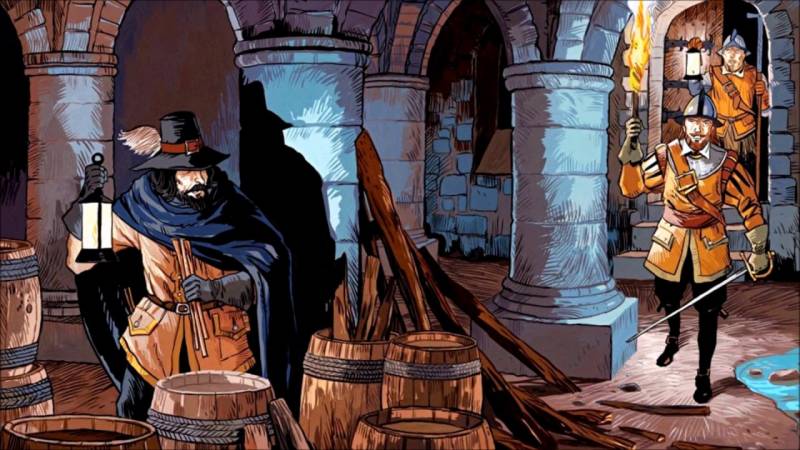
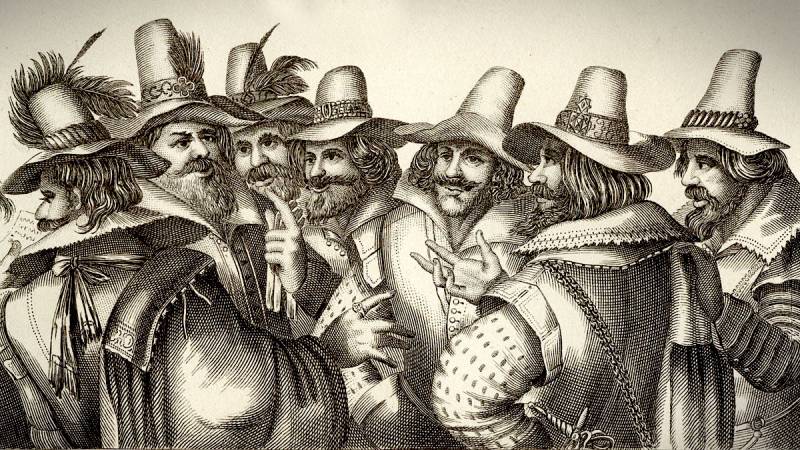
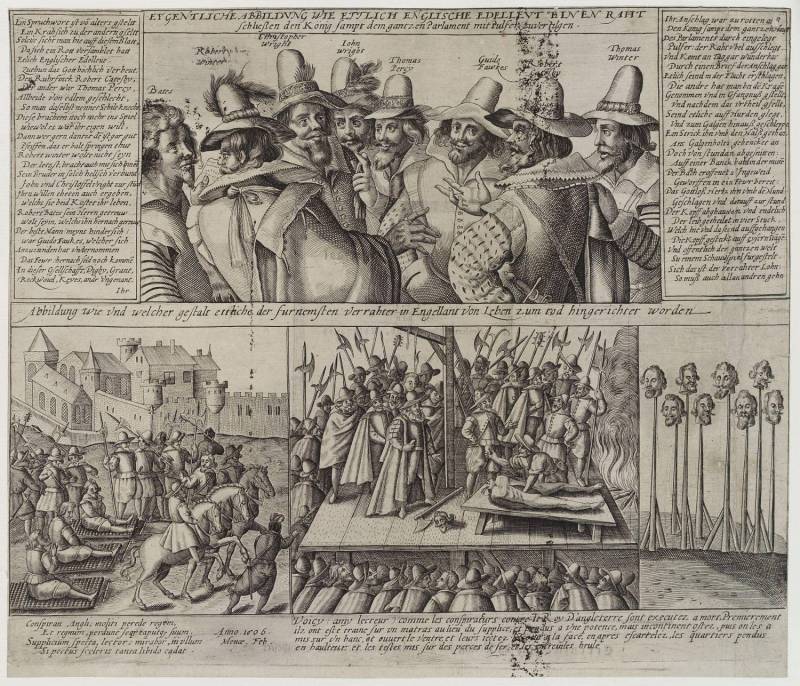
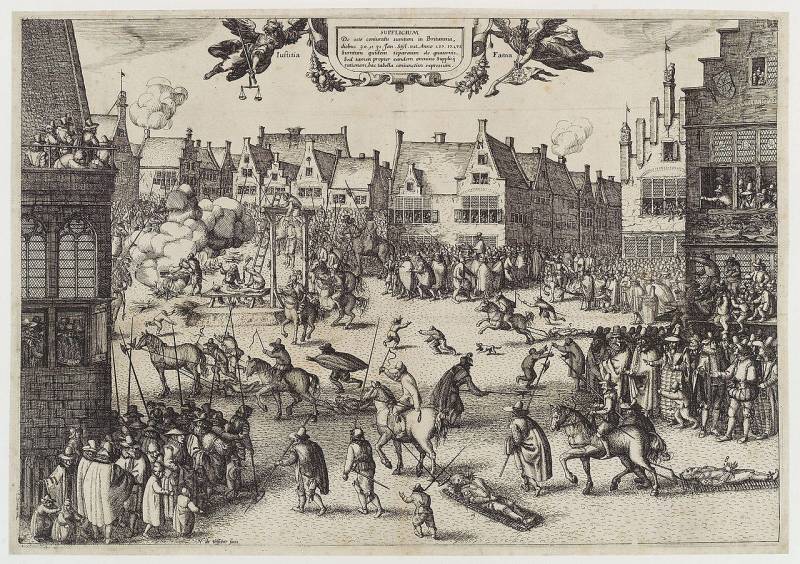
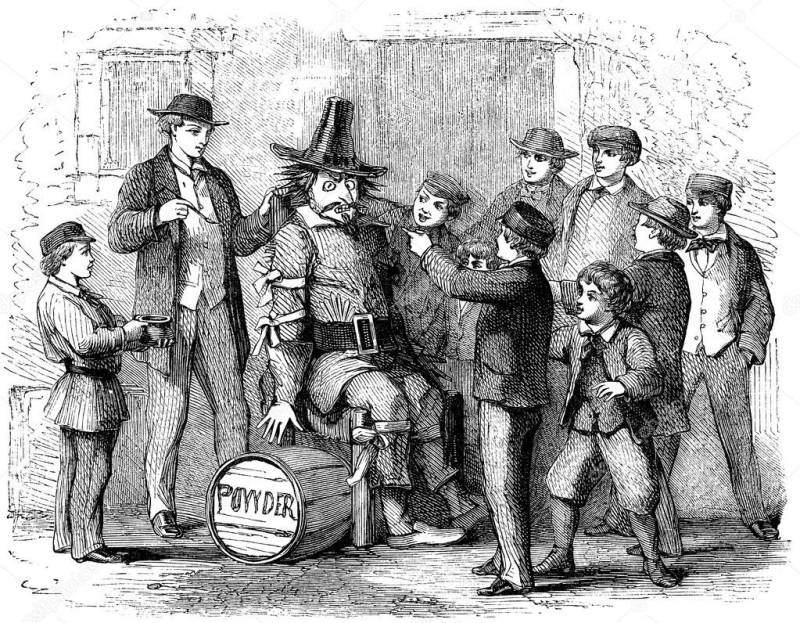

Information